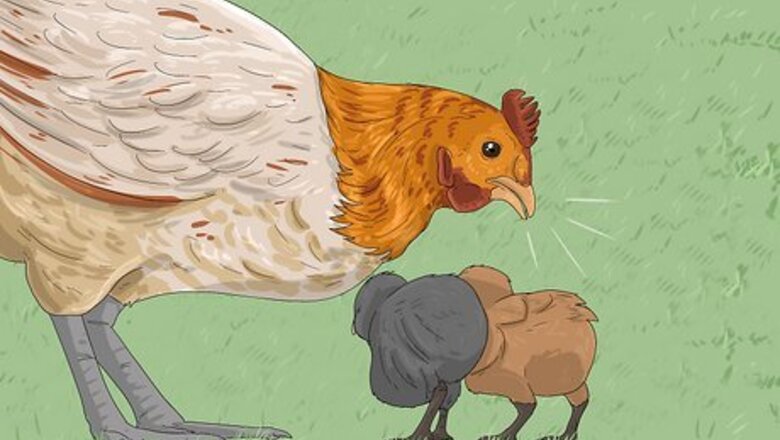
views
Understanding and Responding to Chicken Talk
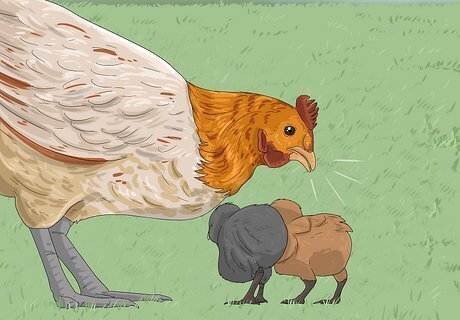
Mimic the way the mother hens talk to their chicks to put them at ease. A mother hen will instinctively make a certain clucking to her chicks when she is out and about with them. It means “Come here, I've found something for you to eat, scratch at, or play with.” It sounds like regular clucking but has a very distinct difference. It will be "kruk kruk," with a rolling r you hear in Spanish accents. Baby chicks will usually make soft, irregular chirping sounds if they are content. They may also trill happily, especially when they are getting ready for a cozy nap.
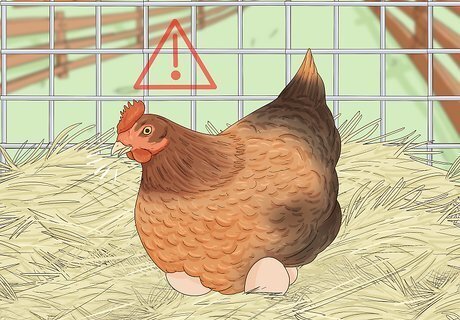
Beware of hissing or growling hens. When a hen is in her nest box, she may hiss at you like a snake if you try to approach. If she really feels threatened, the hiss may become louder and harsher and turn into a growl. This is a clear signal that she wants you to stay away from her eggs. The hens will also often fluff their feathers up when hissing, and may even peck at you when growling to protect their eggs. If you have come to collect eggs, it may be better to return another time to try again.
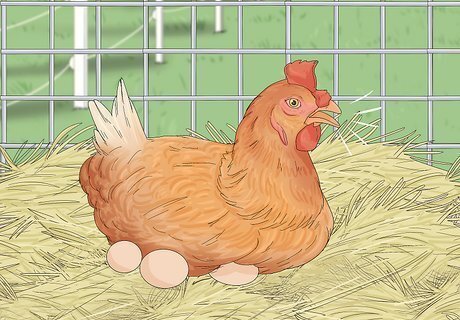
Listen for the laying cackle to know when a hen has laid an egg. After a hen has laid an egg, she often feels very proud of this accomplishment. You may hear her making a very loud clucking sound to announce it to the whole neighborhood.
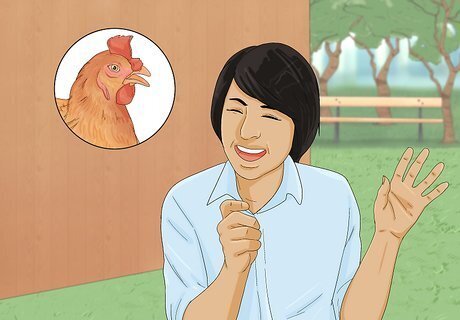
Sing along with happy chickens. When your chickens are clucking random notes and repeating them rapidly, it means they are happily going about their business. Feel free to sing along with them to increase your bond to the group. This is similar to a human happily humming as they go about their day.
Paying Attention to Distress Calls or Warnings
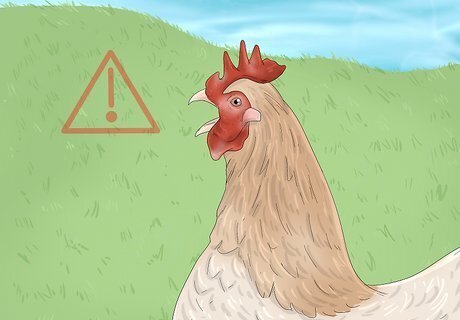
Recognize the distress squawk. If a chicken is crying loudly and repeatedly, it means it has been captured and is being taken away. The chicken is alerting the others in the area to beware and saying “Let go!” If you are the one carrying the chicken away, be careful because the distress squawk might embolden other chickens or the rooster to attack you to save their friend. Be prepared to protect yourself if necessary. Sometimes a chicken will let out just one loud distress squawk, which usually means it’s been startled or unexpectedly pecked by another chicken. Check on baby chicks making distress calls. If you hear a baby chick make a loud, sharp tweet, it means that it is in distress. Check to see if it is too hot, cold, or hungry.
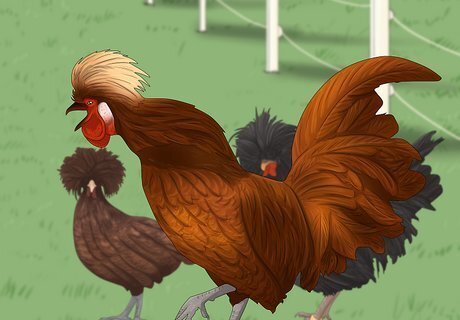
Check on your flock if you hear an alarm cackle. Any of the chickens who sense danger in some way will raise an alarm. They will make a loud, repetitive cackling noise that sounds like “kuh-kuh-kuh-KACK!”. The other chickens will then seek shelter. If you hear the alarm cackle, be sure to check on the chickens to make sure there isn’t a predator after them.
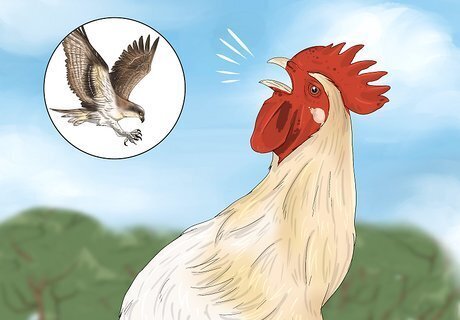
Listen for the rooster sounding the air raid alarm. If your rooster is making loud squawks while looking at the sky, he is letting the others know that there is a raptor or other dangerous predator in the sky above them. Be sure to check on your flock if you hear this sound. If the rooster raises too many false air raid alarms, the chickens will start ignoring the signal. Sometimes the rooster will make a slightly softer “chirrup” sound as it looks at the sky. He is indicating that there is something in the sky, but it is probably not dangerous.
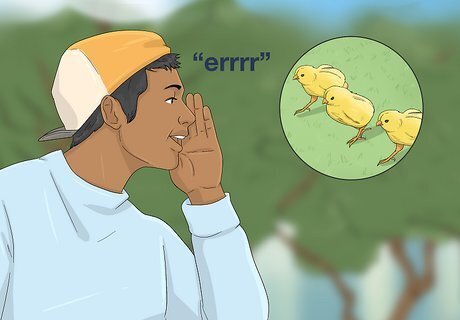
Use the hen’s hushing sound to get chicks to run for cover. Hens will make a soft “errrr” sound to alert their chicks to danger. You can mimic this sound to achieve the same result. Be sure to keep your voice soft and vibrate the sound like you are humming with your lips open and your teeth closed. When the chicks hear the sound, they will run for cover under their mom’s feathers or flatten themselves against the ground to hide.
Training Chickens
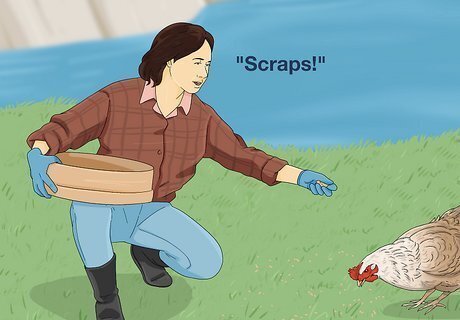
Use one word or sound consistently to teach the chickens. Chickens are capable of learning. If you constantly use one specific call for one task they will respond to it. Remember to be patient and consistent. For example, if you say "Scraps!" every time you bring food out, they will learn to come get food when you say that word.
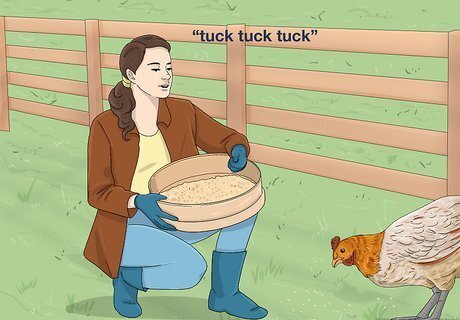
Call your chickens to you using their food call. A short, high-pitched “tuck tuck tuck” sound is chicken code for “I’ve found food, come check it out!” You can mimic this sound when you want to give your chickens something to eat, or if you need to do a role call because you've seen a fox lurking nearby. Both hens and roosters use this call.
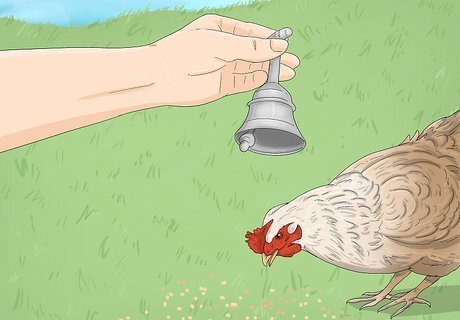
Train the chickens to come to a certain spot with a bell. Ring the bell and throw some mealworms on the ground where the chickens can see them. Continue to ring the bell as they eat the worms so they clearly associate the ringing of the bell with the tasty treat. Do this every day for about a week so they will catch on. Make sure that every chicken gets some mealworms when they come, even those on the bottom of the pecking order. This will ensure that all the chickens have a good reason to come when you ring the bell. After they get used to the bell, you don’t have to give them the worms every single time you call them. Be sure to still give them mealworms sometimes so they continue to have an incentive to respond to the bell.




















Comments
0 comment